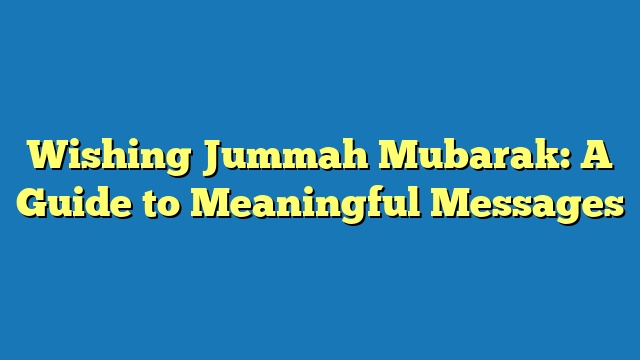Wishing Jummah Mubarak messages are devout greetings Muslims send to each other on Fridays to commemorate the Islamic holy day, Jummah. For instance, a common message is “Jummah Mubarak! May Allah accept our prayers and grant us His blessings.”
These messages have significant religious and cultural value, fostering a sense of community among Muslims. They also carry historical roots, dating back to the early days of Islam, when the Prophet Muhammad (PBUH) emphasized the importance of gathering for Friday prayers.
In this article, we will explore the various forms and uses of Jummah Mubarak messages, their religious and cultural significance, and the historical development that has shaped their practice.
Wishing Jummah Mubarak Messages
Wishing Jummah Mubarak messages are an integral part of Islamic culture and tradition, fostering a sense of community and conveying blessings and well wishes. These messages encompass various aspects, each contributing to their significance and religious importance.
- Religious Significance
- Cultural Tradition
- Conveyance of Blessings
- Expression of Faith
- Community Building
- Historical Roots
- Etiquette and Customs
- Digital Communication
These aspects are deeply intertwined, reflecting the multifaceted nature of Jummah Mubarak messages. From their religious significance to their role in digital communication, each aspect contributes to the rich tapestry of Islamic tradition and practice. Understanding these aspects provides a deeper appreciation for the importance of these messages and their enduring role in Muslim communities worldwide.
Religious Significance
Wishing Jummah Mubarak messages hold deep religious significance in Islamic tradition, serving as expressions of faith, invoking divine blessings, and fostering a sense of community. From their inception, these messages have been a cherished part of Islamic culture, carrying spiritual and communal importance.
-
Invoking Divine Blessings
Muslims believe that Jummah, the Islamic holy day, is an auspicious occasion for supplication and seeking Allah’s blessings. Wishing Jummah Mubarak is a way to collectively invoke divine favor and pray for forgiveness, guidance, and well-being.
-
Strengthening Faith
Exchanging Jummah Mubarak messages reinforces the shared beliefs and values of the Muslim community. By acknowledging the significance of Jummah and extending well wishes, Muslims reaffirm their faith and strengthen their connection to Islam.
-
Promoting Brotherhood
Wishing Jummah Mubarak transcends geographical boundaries, fostering a sense of brotherhood and unity among Muslims worldwide. These messages convey a shared experience and sense of belonging, reminding Muslims of their common identity and faith.
-
Seeking Forgiveness
Jummah is considered a day of forgiveness and redemption in Islamic tradition. Wishing Jummah Mubarak provides an opportunity for Muslims to seek forgiveness from one another and strengthen their bonds of friendship and kinship.
In essence, wishing Jummah Mubarak messages are not mere greetings but expressions of deep religious significance, reflecting the spiritual and communal aspects of Islam. They invoke divine blessings, strengthen faith, promote brotherhood, and facilitate seeking forgiveness, all of which contribute to the richness and beauty of Islamic tradition.
Cultural Tradition
Within the realm of wishing Jummah Mubarak messages, cultural tradition plays a vital role in shaping their customs, practices, and significance. Steeped in Islamic heritage and local customs, these messages transcend mere words, becoming an integral part of Muslim culture and communal identity.
-
Traditional Greetings
Exchanging Jummah Mubarak messages is rooted in traditional Islamic greetings that convey respect, well wishes, and blessings. These greetings vary across regions, reflecting diverse cultural practices and linguistic nuances.
-
Community Gatherings
In many Muslim communities, Jummah Mubarak messages serve as invitations to communal gatherings, fostering a sense of unity and belonging. These gatherings may involve attending mosque prayers, sharing meals, or engaging in charitable activities.
-
Formal and Informal Communication
Wishing Jummah Mubarak can take both formal and informal forms, depending on the context and relationship between individuals. Formal messages often adhere to traditional Arabic phrases, while informal messages may incorporate colloquial language and personal expressions.
-
Digital Exchange
With the advent of technology, wishing Jummah Mubarak has extended to digital platforms, allowing Muslims worldwide to connect and share blessings regardless of geographical boundaries. Digital messages often include images, animations, or verses from the Quran.
Cultural tradition, therefore, permeates every aspect of wishing Jummah Mubarak messages, shaping their form, content, and significance. These messages serve as a testament to the rich cultural heritage of Islam and its ability to adapt to evolving communication methods while preserving its core values and traditions.
Conveyance of Blessings
Wishing Jummah Mubarak messages are deeply rooted in the Islamic tradition of conveying blessings and well wishes. The act of extending blessings on Jummah, the holiest day of the week, holds significant religious and cultural importance.
One of the key aspects of Jummah Mubarak messages is their ability to convey blessings from one individual to another. Muslims believe that invoking divine blessings and good wishes upon others brings about positive outcomes and strengthens the bonds of brotherhood and sisterhood.
For example, a common Jummah Mubarak message might include a prayer for Allah’s blessings, forgiveness, and guidance. By sharing these messages, Muslims not only extend their well wishes but also contribute to a collective atmosphere of positivity and support within the community.
The act of conveying blessings through Jummah Mubarak messages has practical applications in fostering a sense of unity and harmony. It serves as a reminder of the shared values and beliefs that unite Muslims worldwide, regardless of their physical distance or cultural differences.
In conclusion, the conveyance of blessings is a critical component of wishing Jummah Mubarak messages. It not only reflects the religious significance of the day but also strengthens the bonds of community and promotes an atmosphere of positivity and well-being among Muslims.
Expression of Faith
Wishing Jummah Mubarak messages are not mere social greetings; they embody a profound expression of faith that manifests in various ways. These messages serve as a means to reaffirm core Islamic beliefs and strengthen the spiritual bond among Muslims.
-
Declaration of Tawhid
Many Jummah Mubarak messages begin with “Assalamu Alaikum” or “Jummah Mubarak,” which are not merely greetings but declarations of faith. By uttering these words, Muslims affirm their belief in the oneness of Allah and the teachings of Prophet Muhammad (PBUH).
-
Supplication and Dua
Jummah Mubarak messages often include supplications and prayers seeking blessings, forgiveness, and guidance from Allah. These acts of supplication reflect the deep faith and trust Muslims have in Allah’s power and mercy.
-
Gratitude and Remembrance
Expressing gratitude for Allah’s countless blessings is an integral part of Jummah Mubarak messages. Muslims acknowledge the bounties they have received and remember Allah’s presence in their lives, strengthening their faith and connection to the divine.
-
Sharing of Islamic Wisdom
Some Jummah Mubarak messages include verses from the Quran, hadiths, or words of wisdom from Islamic scholars. These messages serve as reminders of important Islamic teachings and help foster a deeper understanding of the faith.
In essence, wishing Jummah Mubarak messages are a multifaceted expression of faith that encompasses declaration, supplication, gratitude, and knowledge. Through these messages, Muslims not only convey blessings but also reaffirm their commitment to Islam and strengthen their spiritual connection to Allah.
Community Building
Wishing Jummah Mubarak messages play a pivotal role in community building within the Muslim community. The exchange of these messages fosters a sense of belonging, unity, and shared identity among Muslims.
One of the key ways in which Jummah Mubarak messages contribute to community building is by strengthening social connections. When Muslims send these messages to one another, they are not only conveying blessings but also reaffirming their bonds of friendship and kinship. This regular communication helps maintain and nurture relationships within the community.
Moreover, Jummah Mubarak messages serve as a reminder of shared values and beliefs. By exchanging these messages, Muslims acknowledge their common faith and commitment to Islamic principles. This shared sense of purpose and identity helps foster a strong sense of community and belonging.
In practical terms, the community-building aspect of Jummah Mubarak messages manifests in various ways. For example, these messages can be used to organize community gatherings, coordinate charitable activities, or simply share information about upcoming events. By facilitating communication and collaboration, Jummah Mubarak messages contribute to the overall well-being and prosperity of the Muslim community.
In conclusion, wishing Jummah Mubarak messages are not merely greetings but powerful tools for community building. They strengthen social connections, reaffirm shared values, and facilitate collaboration within the Muslim community. Understanding this connection is essential for appreciating the full significance and impact of these messages in the context of Islamic faith and culture.
Historical Roots
The tradition of exchanging Jummah Mubarak messages has deep historical roots, reflecting the evolution of Islamic practices and cultural customs over centuries. These roots provide valuable insights into the significance and meaning behind these messages today.
-
Origins in Early Islam
The practice of sending Jummah Mubarak messages can be traced back to the early days of Islam, during the time of Prophet Muhammad (PBUH). Muslims would gather for Friday prayers, exchange greetings, and invoke blessings upon one another.
-
Spread through Trade and Conquest
As Islam spread across different regions through trade and conquest, the practice of exchanging Jummah Mubarak messages traveled with Muslim communities. It became a way for Muslims to stay connected and maintain a sense of unity despite geographical distances.
-
Influence of Sufi Saints
Sufi saints played a significant role in popularizing the practice of sending Jummah Mubarak messages. They emphasized the importance of sending blessings and well wishes to others, and their teachings contributed to the widespread adoption of this custom.
-
Adaptation to Modern Communication
With the advent of modern communication technologies, the tradition of exchanging Jummah Mubarak messages has adapted to new platforms. Muslims now use social media, messaging apps, and email to share these messages, extending the reach and impact of this practice.
Understanding the historical roots of wishing Jummah Mubarak messages enriches our appreciation for their significance and continuity within Islamic tradition. These messages serve as a tangible link to the past, reminding us of the deep bonds of faith and community that have united Muslims throughout history.
Etiquette and Customs
Etiquette and customs play a significant role in the exchange of Jummah Mubarak messages, shaping the manner in which these messages are conveyed and received. Adhering to proper etiquette ensures that the messages are delivered respectfully and in accordance with Islamic traditions.
One of the key aspects of etiquette in wishing Jummah Mubarak is the use of appropriate language and tone. Muslims typically use formal and respectful language when sending these messages, avoiding casual or slang terms. The choice of words and phrases should reflect the solemnity and significance of the occasion.
Another important aspect of etiquette is the timing of Jummah Mubarak messages. Muslims generally send these messages on Friday, before or after the Friday prayers. Sending messages outside of this timeframe may be considered and disrespectful.
Understanding the etiquette and customs associated with wishing Jummah Mubarak helps ensure that these messages are exchanged in a manner that is respectful, appropriate, and in accordance with Islamic traditions. By adhering to these customs, Muslims can effectively convey their well wishes and blessings to one another, strengthening the bonds of community and faith.
Digital Communication
The advent of digital communication has significantly impacted the practice of wishing Jummah Mubarak messages. With the widespread use of smartphones and internet connectivity, Muslims can now share these messages quickly and easily across vast distances.
Digital communication has become a critical component of wishing Jummah Mubarak messages for several reasons. Firstly, it allows Muslims to stay connected with friends and family members who live far away. By sending Jummah Mubarak messages through social media platforms, messaging apps, and email, Muslims can maintain strong bonds and share in the blessings of the day.
Secondly, digital communication has made it possible for Muslims to share creative and visually appealing Jummah Mubarak messages. The use of images, videos, and animations adds a new dimension to these messages, making them more engaging and memorable.
In practical terms, the integration of digital communication into the tradition of wishing Jummah Mubarak messages has fostered a greater sense of community and unity among Muslims worldwide. It has also facilitated the spread of Islamic knowledge and teachings, as many Jummah Mubarak messages include verses from the Quran, hadiths, and other religious texts.
In conclusion, digital communication has revolutionized the way Muslims exchange Jummah Mubarak messages, making it easier, more convenient, and more meaningful. By embracing digital platforms, Muslims can stay connected, share blessings, and strengthen their faith in the digital age.
Wishing Jummah Mubarak Messages FAQs
The following FAQs address common questions and provide further insights into the significance and usage of wishing Jummah Mubarak messages.
Question 1: What is the significance of wishing Jummah Mubarak?
Wishing Jummah Mubarak is a way to convey blessings, well wishes, and prayers for forgiveness, guidance, and well-being on the holy day of Jummah.
Question 2: How do I wish someone Jummah Mubarak?
You can wish someone Jummah Mubarak by sending them a message, saying it in person, or sharing a Jummah Mubarak greeting card or image.
Question 3: What are some common Jummah Mubarak messages?
Common Jummah Mubarak messages include “Jummah Mubarak,” “May Allah accept our prayers,” and “May Allah bless you on this blessed day.”
Question 4: When is the best time to wish someone Jummah Mubarak?
The best time to wish someone Jummah Mubarak is on Friday, before or after the Friday prayers.
Question 5: Can I wish Jummah Mubarak to non-Muslims?
Yes, you can wish Jummah Mubarak to non-Muslims as a gesture of goodwill and respect.
Question 6: What is the difference between Jummah Mubarak and Eid Mubarak?
Jummah Mubarak is a greeting for the holy day of Friday, while Eid Mubarak is a greeting for the Islamic holidays of Eid al-Fitr and Eid al-Adha.
Summary of key takeaways or final thought
Wishing Jummah Mubarak messages are a meaningful way to connect with fellow Muslims, convey well wishes, and strengthen the bonds of community. Understanding the significance, etiquette, and customs associated with these messages enriches our appreciation for their role in Islamic tradition and practice. As we delve deeper into the topic of Jummah Mubarak, we will explore the spiritual, social, and cultural dimensions of this significant day in the Muslim calendar.
Transition to the next article section
In the next section, we will examine the spiritual significance of Jummah and its importance in the lives of Muslims. We will discuss the religious rituals, practices, and beliefs that make Jummah a day of reflection, worship, and community.
Tips for Sending Meaningful Jummah Mubarak Messages
Exchanging Jummah Mubarak messages is a thoughtful way to connect with fellow Muslims and extend blessings on this special day. Here are some tips to help you craft and send meaningful messages that convey your well wishes in the best possible way:
Tip 1: Use Sincere and Heartfelt Language
Your words should come from the heart and reflect the spirit of Jummah. Avoid generic or impersonal messages, and instead opt for expressions that convey your genuine well wishes and blessings.
Tip 2: Personalize Your Messages
Make your messages more meaningful by personalizing them for the recipient. Mention their name, acknowledge their good deeds, or express appreciation for their friendship. A personal touch can make your message stand out.
Tip 3: Include Islamic Quotes or Verses
Incorporating verses from the Quran or hadiths into your Jummah Mubarak messages adds a spiritual dimension and reminds the recipient of the significance of the day. Choose verses that resonate with the message you want to convey.
Tip 4: Use Creative and Visually Appealing Formats
Don’t limit yourself to text-only messages. Use images, videos, or animations to create visually appealing Jummah Mubarak greetings that are sure to capture the recipient’s attention and leave a lasting impression.
Tip 5: Share Islamic Knowledge and Insights
Jummah is an excellent opportunity to share Islamic knowledge and insights. Include a brief dua, a reminder about the importance of salah, or a quote from a respected Islamic scholar. Your message will not only convey well wishes but also contribute to the recipient’s spiritual growth.
Tip 6: Send Your Messages Early
It is customary to send Jummah Mubarak messages on Friday, before or after the Friday prayers. Sending your messages early ensures that they are received and appreciated on this special day.
Summary: By following these tips, you can create thoughtful and meaningful Jummah Mubarak messages that convey your heartfelt well wishes and strengthen the bonds of community among Muslims.
Transition: As we conclude this exploration of Jummah Mubarak messages, let us reflect on the importance of fostering unity and brotherhood within the Muslim community. In the final section of this article, we will delve into the collective power of these messages and their contribution to building strong and vibrant Muslim communities.
Conclusion
Our exploration of wishing Jummah Mubarak messages has shed light on their multifaceted significance within Islamic tradition and practice. These messages serve as expressions of faith, convey blessings and well wishes, and contribute to community building. The act of exchanging Jummah Mubarak messages not only strengthens the bonds between individuals but also fosters a sense of unity and belonging within the Muslim community.
As we reflect on the key points discussed in this article, we are reminded of the importance of faith, community, and shared values. Jummah Mubarak messages are more than mere greetings; they are tangible expressions of the spiritual and social fabric that binds Muslims together. By embracing the tradition of wishing Jummah Mubarak, we contribute to the preservation and propagation of Islamic values, fostering a vibrant and cohesive Muslim community.









Tips for Using "Template by Kevin Crafts" Comments for Meaningful Online Discussions